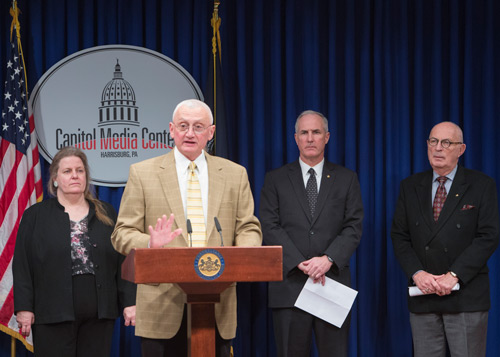DiGirolamo Unveils Marcellus Drilling Tax Proposal
 |
| Rep. Gene DiGirolamo today unveiled his proposal to impose a tax on the drilling industry in Pennsylvania, while keeping the impact fee contained within Act 13 of 2012. He believes the legislation could serve as a starting point for continued discussions regarding a drilling fee and the funding of numerous priorities at the state level, including education, pensions, human services and environmental programs, to benefit every Pennsylvania citizen. |
HARRISBURG – In seeking to raise necessary funds for some of the Commonwealth’s top priorities without passing the burden onto working families, Rep. Gene DiGirolamo (R-Bucks) today held a press conference to discuss legislation to impose a drilling tax within the Marcellus Shale and distribute those proceeds to statewide initiatives.
In keeping with policies in other states with large natural gas reserves, DiGirolamo’s proposal calls for a 3.2 percent drilling tax, while also keeping the impact fee created by Act 13 to help communities directly affected by drilling.
“Most Pennsylvanians agree that we should enact a drilling tax as a matter of sound public policy, but the discussion at this point is what that tax will look like and what priorities it would fund,” DiGirolamo said. “In addition, it’s important to keep the impact fee in place so that communities directly dealing with drilling can still be protected. This legislation is a start to the conversation, and one that I believe will continue throughout this session.”
DiGirolamo was joined at the press conference in Harrisburg by three leading co-sponsors of his proposal, Reps. Tom Murt (R-Montgomery/Philadelphia), Harry Readshaw (D-Allegheny) and Pam DeLissio (D-Philadelphia/Montgomery).
DiGirolamo also believes that the drilling tax is far more sustainable than an impact fee alone. Under the current impact fee, each well is assessed a fee which declines over time for the first 15 years of operation. All unconventional wells drilled each year, no matter how much natural gas is produced, pay the same fee. For what is thought to be a typical unconventional well, the total impact fees paid over 15 years amount to less than 2 percent of the value of the natural gas sold from the well.
Rep. DiGirolamo’s video comments:
“As the value of production grows, so would the severance tax revenue,” DiGirolamo added. “This would provide needed additional funding dollars for education, human services and environmental programs, while also helping to make the required increase in pension contributions more manageable.”
According to DiGirolamo’s legislation, the tax would be set up in a way that in the first year 1 percent of the tax will equal $6 million, and would grow to more than $9 million per percentage point by 2019-20 with continued modest growth in production. Revenue would be distributed to the following priorities: basic education, 40 percent; pension obligations, 35 percent; human services, 15 percent; and environmental programs, 10 percent.
The lawmaker believes that his proposal is fair and reasonable to the industry, assists impacted communities, makes long-term investments in natural resources and environmental programs, strengthens the safety net for those in need, and allows every citizen to benefit.
Pennsylvania, now the second largest producer of natural gas in the nation, is the only major gas producing state that does not impose a drilling tax.
Representative Gene DiGirolamo
18th District
Pennsylvania House of Representatives
Media Contact: Jennifer Keaton
717.705.2094
jkeaton@pahousegop.com
GeneDiGirolamo.com /
Facebook.com/GeneDiGirolamo